Someone is browsing your website, credit card in hand. In a few minutes, they’ll be gone. All because they couldn’t find the shipping information they needed. Or they needed quick pricing confirmation. They require instant support, and they’ll find someone who’s got it.
Digital customer service tools can prevent this. These platforms help support teams respond in real time and manage conversations more naturally. With the right setup, they create smoother interactions and provide solutions without delays.
In fact, 90% of consumers are more likely to consider doing business with a company that offers multiple ways to communicate, highlighting the importance of digital customer service channels.
In this article, you’ll find a clear overview of how these tools work, which features are worth paying attention to, and a selection of trusted platforms to explore.
Streamline support with a top digital customer service tool
What is a digital customer service tool?
Digital customer service tools help businesses manage conversations across online channels. Whether someone reaches out through live chat, sends a message on social media, or replies to an email, these tools keep everything organized and easy to follow.
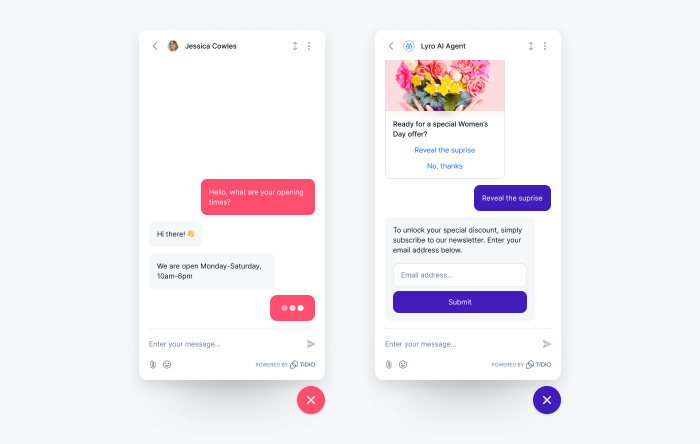
Tidio is a good example of a digital customer service platform that brings all those channels into one place. With its shared inbox, you can manage messages from live chat, email, and platforms like Facebook Messenger without switching tabs. It also offers automation features, including an AI agent, Lyro, that can handle repetitive questions and help teams respond faster while keeping support consistent.
Key features to look for in a digital customer service tool
Not every platform is built the same. Some focus on live chat, while others combine messaging with automation, reporting, and even customer relationship management.
If you’re choosing a tool to support your team long-term, it helps to look for features that improve both the agent experience and how customers interact with your business.
Here are the features worth paying attention to:
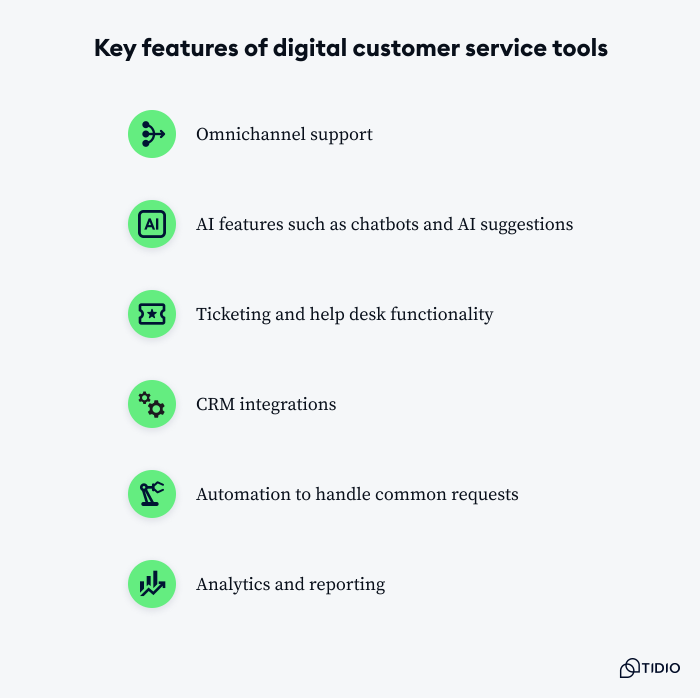
- Omnichannel support: lets your team manage conversations across chat, email, social media, and other channels from one place. This keeps things organized and helps customers reach out wherever it’s most convenient for them.
- AI features such as chatbots and AI suggestions: these assist with quick answers and reduce the pressure on support teams. Bots can handle routine questions, while suggestions help agents respond faster without typing everything from scratch.
- Ticketing and help desk functionality: turns messages into trackable tasks your team can prioritize and resolve. It also helps agents see which requests are open, who’s working on what, and how long each issue has been waiting.
- CRM integrations: pull in customer data so agents can respond with more context. When teams have access to order history or account details, conversations feel more helpful and less repetitive.
- Automation to handle common requests: routes messages, sends auto-replies, or triggers follow-ups. It’s a practical way to keep things moving when your team is busy or outside of business hours.
- Analytics and reporting: show patterns in support activity, like how quickly your team responds or which questions come up most often. With that data, it’s easier to make decisions about staffing, training, or even updating your help center content.
Read more: Here’s all you should know about omnichannel customer service.
The best digital customer service solutions
A good tool should fit into your daily workflow, not force you to change it. It should make responding easier and give customers the kind of experience that makes them want to come back.
Here’s a closer look at some of the digital customer service software that is actually up to the task.
| Digital customer service solution | Rating | Free plan | Best for |
| Tidio | 4.7/5 ⭐️ | ✅ | Chatbot automation |
| Intercom | 4.5/5 ⭐️ | Free trial | Conversational support & product tours |
| Help Scout | 4.4/5 ⭐️ | ✅ | Email-first teams |
| Zendesk | 4.3/5 ⭐️ | Free trial | Advanced ticketing system |
| Freshdesk | 4.4/5 ⭐️ | ✅ | Multichannel support |
| HubSpot | 4.4/5 ⭐️ | Free trial | CRM-integrated support |
| Gorgias | 4.6/5 ⭐️ | Free trial | Ecommerce and Shopify integration |
| Gladly | 4.6/5 ⭐️ | Free trial | Customer identity-driven conversations |
| Front | 4.7/5 ⭐️ | Free trial | Team inbox and collaboration |
1. Tidio
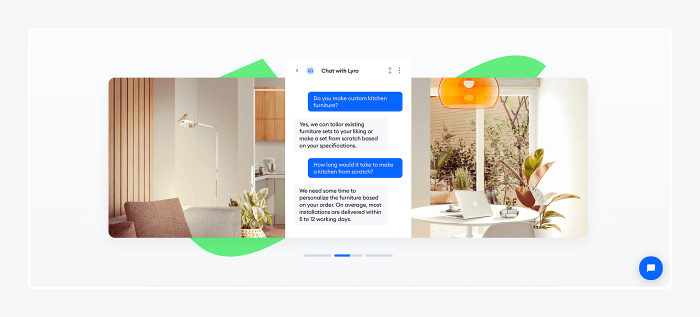
Rating: 4.7/5 ⭐️ (1,665+ reviews)
Tidio is a versatile customer service platform that combines live chat, chatbots, and multichannel support to enhance customer engagement. It’s particularly beneficial for businesses seeking to automate responses and provide real-time assistance across various channels like email, Messenger, Instagram, and WhatsApp.
Tidio’s AI-powered Lyro agent can handle up to 70% of customer inquiries, freeing up human agents for more complex issues. The platform is user-friendly and quick to set up, making it an excellent choice for teams looking to improve their customer support efficiency.
Main features:
- Live chat and multichannel support (email, Messenger, Instagram, WhatsApp)
- Lyro AI Agent for 24/7 automated conversations
- Lyro Copilot to assist agents with suggested replies
- Automated ticket routing and smart agent handover
- Customizable chat widgets and proactive messaging
Pricing:
- 7-day free trial available
- Free version available
- Starter ($24.17/mo)
- Growth (starts at $49.17/mo)
- Plus (starts at $749/mo)
- Premium (starts at $2999/mo)
Read more: Find out how Cove Smart achieved a 70% increase in self-service resolution with Lyro AI. Also, be sure to read about the use cases, benefits, and challenges of AI customer service agents.
Choose the right digital customer service platform for your team
2. Intercom
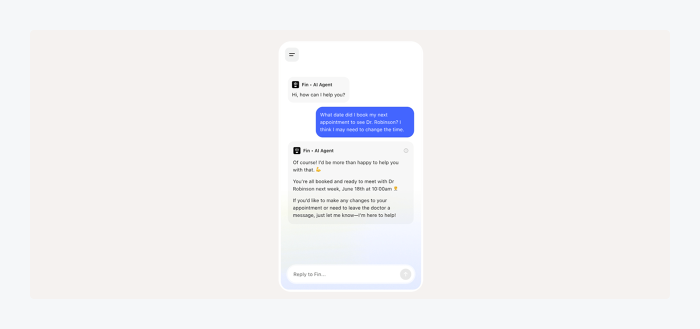
Rating: 4.5/5 ⭐️ (3,375+ reviews)
Intercom is a comprehensive customer communication platform that offers live chat, chatbots, and email marketing. It’s designed to provide personalized customer experiences and streamline support workflows. Intercom’s AI capabilities enable businesses to automate interactions, reducing response times and improving customer satisfaction. The platform is suitable for companies of all sizes looking to enhance their customer engagement strategies.
Pros:
- Fin AI Agent that handles customer inquiries with human-like responses
- Copilot that suggests real-time replies and actions for agents
- AI-powered reporting that tracks team performance and satisfaction metrics
Cons:
- Pricing can be complex and may become expensive as you scale
- Some users report a steep learning curve
- Essential ($39/seat/mo)
- Advanced ($85/seat/mo)
- Expert ($132/seat/mo)
Read more: Check out the best Intercom alternatives.
3. Help Scout
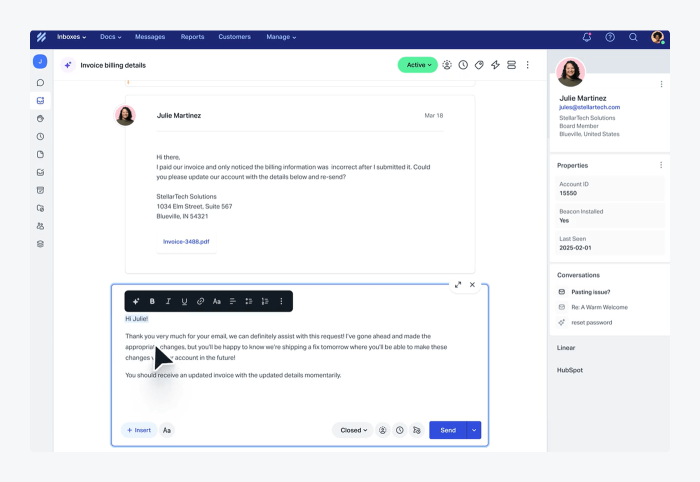
Rating: 4.4/5 ⭐️ (407+ reviews)
Help Scout is built for teams that want a simple, email-first support platform without all the extra layers. It gives you a shared inbox with features like collision detection, so agents don’t accidentally reply to the same message. The Beacon widget combines chat, help articles, and contact options into one place where customers can easily use.
You also get workflow automation, which helps with things like routing conversations and setting up follow-up actions. For small and mid-sized teams, it’s a tool that keeps support efficient without adding complexity.
Pros:
- AI Assist that helps draft, edit, and translate replies directly within the inbox
- AI Answers that automatically respond to customer questions
- Inbox 2 workspace offering improved filtering, organization, and AI-powered drafts
Cons:
- Limited customization options
- May lack advanced features for larger enterprises
- Free plan available
- Standard ($55/mo)
- Plus ($83/mo)
Read more: Here are the top Help Scout alternatives and competitors.
4. Zendesk
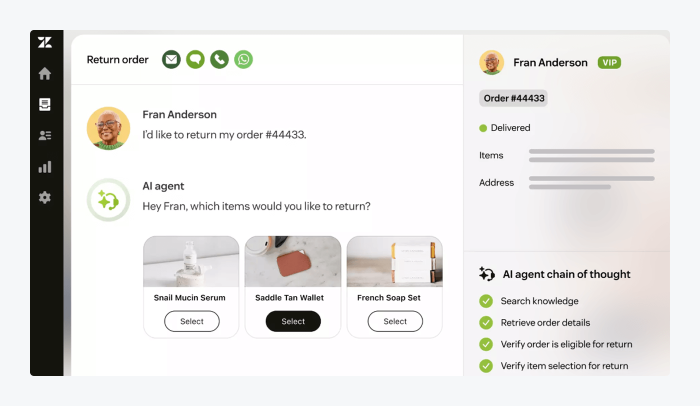
Rating: 4.3/5 ⭐️ (6,200+ reviews)
Zendesk is a digital customer experience platform built for companies that need a structured, scalable system to handle support across channels. It brings everything: live chat, email, help center, social messaging, and even voice, into one workspace. AI features like ticket triage, intent detection, and sentiment analysis help prioritize requests so agents can focus where it matters most. Teams can also use tools like macros and automated workflows to manage high volumes without getting overwhelmed.
Pros:
- Custom objects that allow businesses to tailor data structures to their specific needs
- Sunshine Conversations for integrating messaging across various channels
- Flow Builder that enables the creation of automated conversation flows
Cons:
- Can be complex to set up and configure
- Higher pricing tiers may be costly for small businesses
- Suite Team ($55/agent/mo)
- Suite Growth ($89/agent/mo)
- Suite Professional ($115/agent/mo)
- Suite Enterprise ($169/agent/mo)
Read more: Learn about the top Zendesk alternatives on the web.
5. Freshdesk
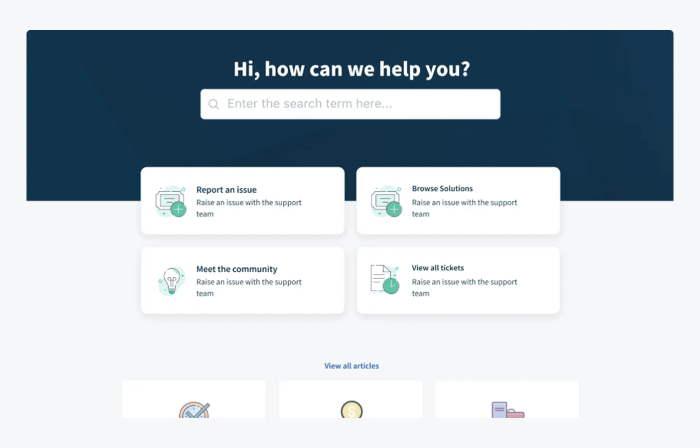
Rating: 4.4/5 ⭐️ (3,500+ reviews)
Freshdesk helps support teams manage conversations from email, chat, phone, and social media in one place. It includes tools like a knowledge base and Freddy AI, which can suggest replies, perform automated ticket routing, and highlight helpful articles based on each query.
Teams can collaborate using features like parent-child ticketing and internal huddles, and the reporting dashboard tracks performance metrics like resolution time and agent workload. With flexible pricing and a clear interface, it works well for smaller teams and scales easily as they grow.
Pros:
- Customizable SLAs to manage response times based on customer priority
- Role-based access for secure, controlled team permissions
- Multilingual support for engaging global customers
Cons:
- Some advanced features are only available in higher-tier plans
- Steep learning curve for complex configurations
- Free plan available
- Growth ($15/agent/mo)
- Pro ($49/agent/mo)
- Pro + AI Copilot ($78/agent/mo)
- Enterprise( $79/agent/mo)
Read more: Check out the best Freshdesk alternatives out there.
6. HubSpot Service Hub
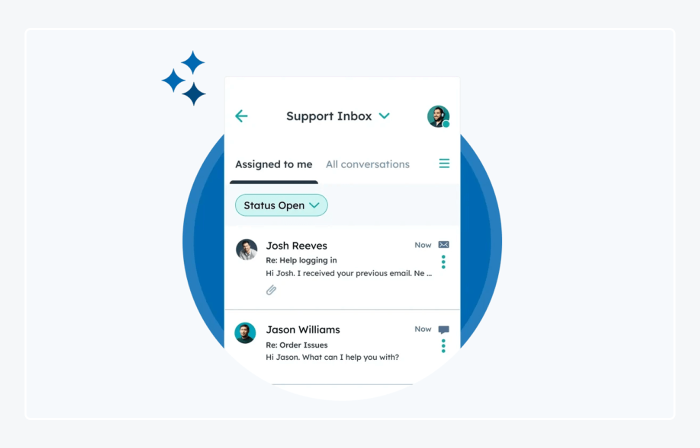
Rating: 4.4/5 ⭐️ (2,505+ reviews)
HubSpot Service Hub is a customer service software that integrates seamlessly with HubSpot’s CRM platform. It offers tools like ticketing, live chat, and a knowledge base to help businesses manage customer interactions effectively. The platform’s automation features and reporting tools enable support teams to improve efficiency and customer satisfaction. HubSpot Service Hub is ideal for businesses already using HubSpot’s marketing and sales tools.
Pros:
- AI-powered tools that assist in ticket routing and response suggestions
- Customizable feedback surveys
- SLA management features
Cons:
- Pricing can be high for advanced features
- May have a learning curve for new users
- Free plan available
- Service Hub Starter ($15/seat/mo)
- Starter Customer Platform ($15/seat/mo)
- Service Hub Professional ($90/seat/mo)
- Service Hub Enterprise (Starts at $150/seat/mo)
Read more: Here are the best HubSpot alternatives.
7. Gorgias
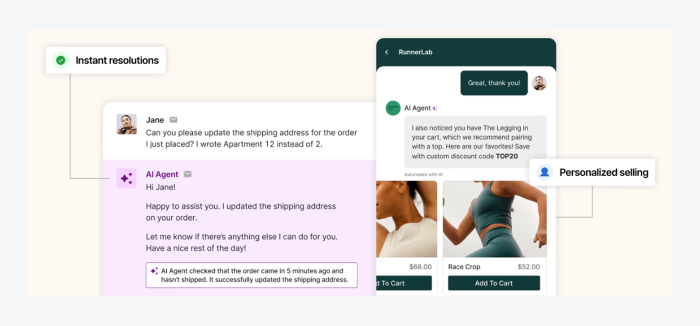
Rating: 4.6/5 ⭐️ (520 reviews)
Gorgias is a customer service platform tailored for ecommerce businesses. It integrates with platforms like Shopify, Magento, and BigCommerce to centralize customer interactions from various channels, including email, live chat, social media, and SMS. Gorgias offers automation features to handle repetitive tasks, allowing support teams to focus on more complex issues. The platform’s deep ecommerce integrations make it a powerful tool for online retailers.
Pros:
- AI agent that autonomously handles order updates, refunds, and subscription management
- A revenue dashboard that tracks the impact of support interactions
- Sentiment analysis tools
Cons:
- Pricing based on ticket volume can lead to unpredictable costs
- Limited features for non-ecommerce businesses
- Starter (Starting at $10/mo—includes 50 tickets)
- Basic (Starting at $86/mo—includes 300 tickets)
- Pro (Starting at $300/mo—includes 2,000 tickets)
- Advanced (Starts at $750/mo—includes 5,000 tickets)
Read more: Here’s a list of the leading Gorgias alternatives available on the market.
8. Gladly
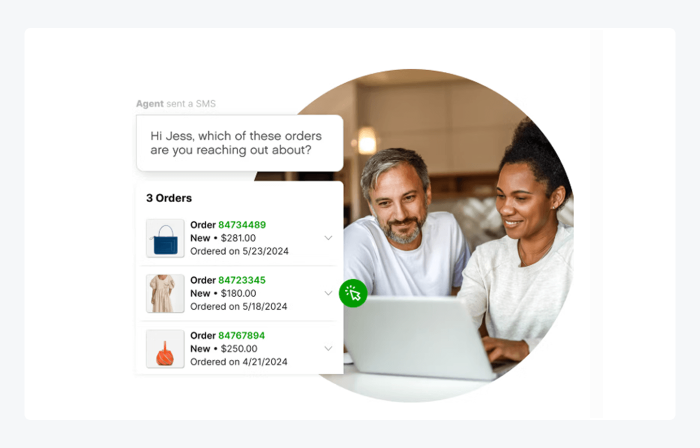
Rating: 4.7/5 ⭐️ (1,021 reviews)
Gladly is a customer service platform that focuses on personalized, conversation-based support. Unlike traditional ticketing systems, Gladly organizes customer interactions into continuous conversations, providing agents with full context and history. The platform supports various channels, including voice, email, SMS, and social media, allowing customers to communicate through their preferred method. Gladly is suitable for businesses aiming to deliver high-touch, personalized customer experiences.
Pros:
- People Match® that routes customers to the most suitable agent
- Built-in IVR and voice support
- Real-time dashboards
Cons:
- Higher pricing may not be suitable for small businesses
- Limited third-party integrations compared to competitors
Pricing:
- Request a demo
9. Front
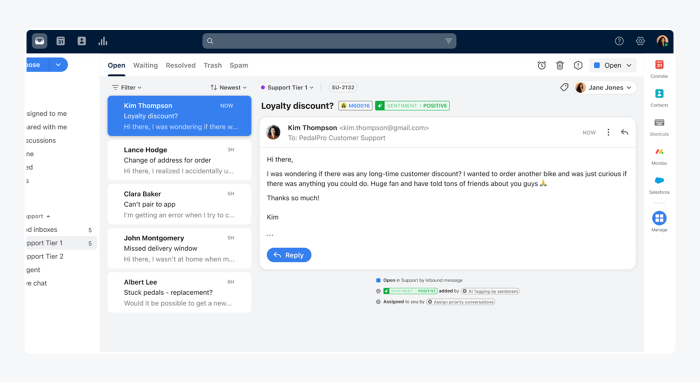
Rating: 4.7/5 ⭐️ (2,270+ reviews)
Front is a modern customer service platform that combines the familiarity of email with the efficiency of a help desk. It offers a collaborative workspace where teams can manage all customer communications in a single, unified inbox, including email, chat, SMS, and social media.
Front’s intuitive interface and powerful automation tools streamline workflows, making it easier for support teams to provide personalized and timely responses. With robust analytics and integration capabilities, Front empowers businesses to enhance customer satisfaction and team productivity.
Pros:
- AI-assisted drafts that help agents compose replies faster by suggesting responses based on conversation context
- Customizable chat widgets that align with your brand’s identity, enhancing customer engagement
- No-code automation builder enabling teams to create workflows without technical expertise
Cons:
- Pricing can be higher compared to some other customer service tools.
- Some users report occasional delays in email syncing.
- Starter ($19/mo)
- Growth ($59/mo)
- Scale ($99/mo)
- Premier: Custom pricing
Why digital customer service tools matter
When someone messages your business, they usually aren’t in the mood for delays or repetition. Here are a few ways digital customer service tools help and why it matters:
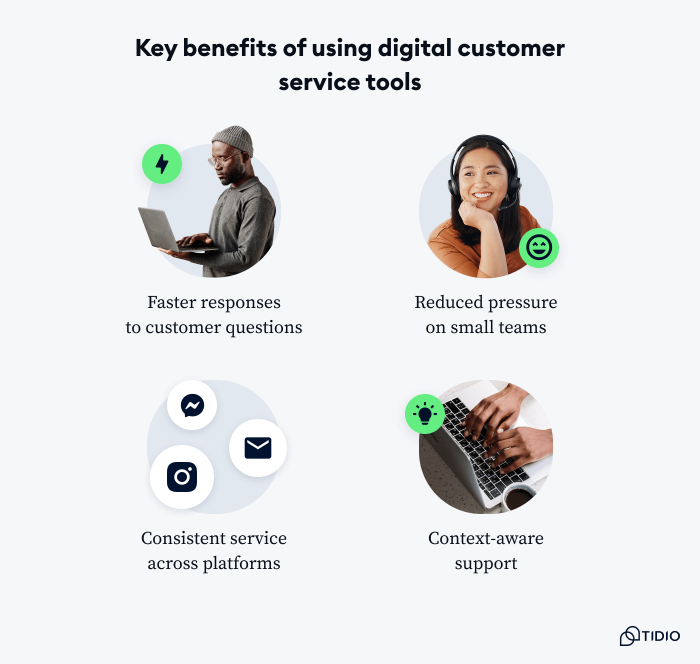
- Faster responses to customer questions: When agents have everything in one place, they can reply with fewer delays and less back-and-forth. Zendesk found that 72% of consumers want immediate service, not long waits or vague replies.
- Reduced pressure on small teams: With automated replies and routing in place, teams can handle higher volumes without burning out. According to Coveo, 56% of consumers won’t even complain when they have a bad experience—they’ll simply leave.
- Consistent service across platforms: A unified workspace keeps things organized even when customers switch channels mid-conversation. Hyken’s research shows that 79% of people would change companies if they thought they could get better service elsewhere.
- Context-aware support: When agents can see full histories and relevant data, customers don’t need to repeat themselves. That makes interactions quicker and more helpful.
How to choose the right digital customer service tool
The right fit depends on what your team handles every day, how you like to work, and what your customers expect when they reach out. A few smart choices early on can save hours of troubleshooting later.
Here’s what to focus on when comparing your options.
1. Review your current setup
Start by looking at how your team manages support now.
Are messages coming in from multiple places, like email, chat, or Instagram DMs? Do agents have to switch tabs to get the full story?
If it feels scattered, you’re not alone. With Tidio, you can bring all customer messages into one shared inbox, so your team sees everything in one view and responds faster without jumping between tools.
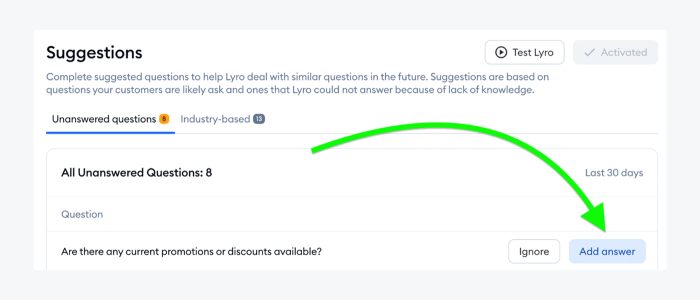
It also helps to pinpoint where things break down. Maybe handoffs between agents take too long, or replies sit in the queue while someone tracks down context. Lyro, Tidio’s AI agent, picks up unanswered questions automatically and passes complex cases to humans with full history included. That means fewer delays and less confusion for everyone involved.
2. Decide how much automation you need
If your inbox is constantly backed up with common questions like pricing, shipping times, or return policies, tools like Lyro can step in to resolve those instantly, without waiting for a human. Lyro can also learn from your FAQs and past chats, so it’s ready to help from day one.
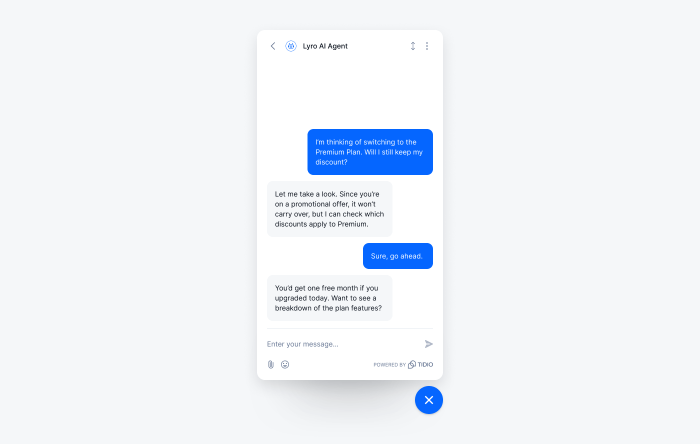
If your volume is more manageable, lighter automation may be enough. Tidio offers chatbot templates, reply suggestions, and keyword-triggered messages that keep conversations moving without replacing your team. It’s a flexible setup that lets you scale automation at your own pace.
3. Look at integration options
Support tools work best when they connect with the systems you already use. That includes CRMs like HubSpot, ecommerce platforms like Shopify or Wix, and help desk systems for those managing technical tickets. If the tool doesn’t plug in easily, you could end up spending more time switching tabs than solving problems.
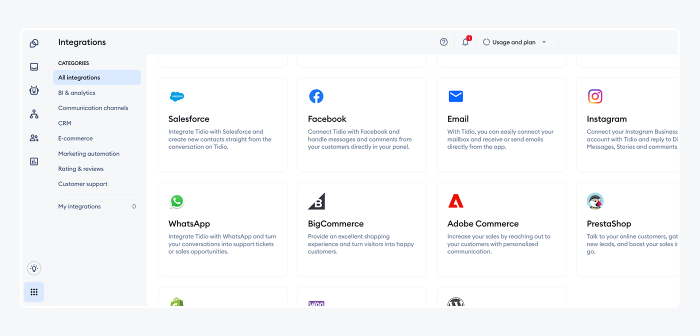
Tidio integrates with all of the above and more. You can sync customer data from your store, trigger automation based on purchase behavior, and keep all information in one place. That way, every message comes with the context your team needs, without the need for extra copy-pasting or guesswork.
4. Test for usability
The best tool on paper won’t help much if your team dreads using it. Before committing, try a demo or free trial to see how the platform actually feels in day-to-day work. Can agents find what they need quickly? Does it take too many clicks to reply or assign a conversation?
Tidio offers a fully interactive free trial with no credit card required, so your team can explore features, test automation, and see how it fits into their routine. Getting real feedback early on helps you spot dealbreakers and make sure the tool supports how your team already works.
5. Consider reporting and insights
Even the smoothest setup needs occasional adjustments. Tools with built-in reporting help you spot gaps before they turn into bigger issues, like slow response times, missed conversations, or topics that keep coming up. Without data, you’re stuck guessing what needs to improve.
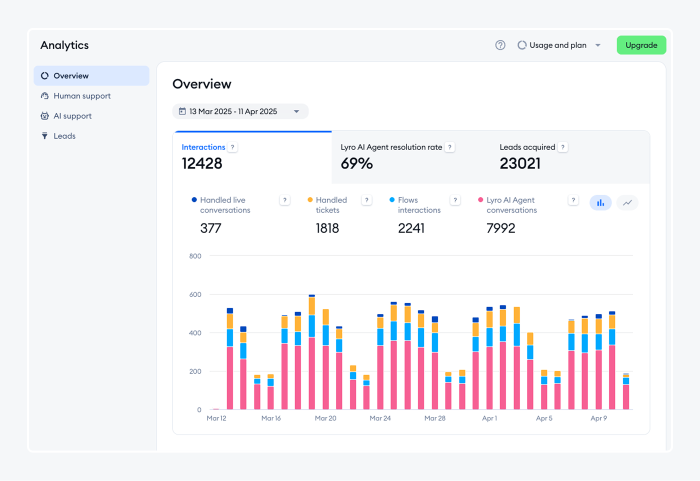
Tidio includes an analytics dashboard that tracks chat volume and resolution rates over time. It’s a simple way to see what’s working and where your team could use more support or resources.
Pick the right digital customer service tool for your needs
The tool you choose shapes how your team works and how your customers feel after every conversation. A reliable platform makes it easier to stay organized and respond quickly, not to mention helping you build stronger relationships without stretching your team too thin.
If you’re looking for a flexible solution that covers live chat, automation, and AI support in one place, Tidio is a great place to start. With Lyro, you can go a step further and let an AI agent resolve common questions for you, no extra setup required.
Try it out for yourself and see how it fits your workflow.
Choose the right digital customer service platform for your team

